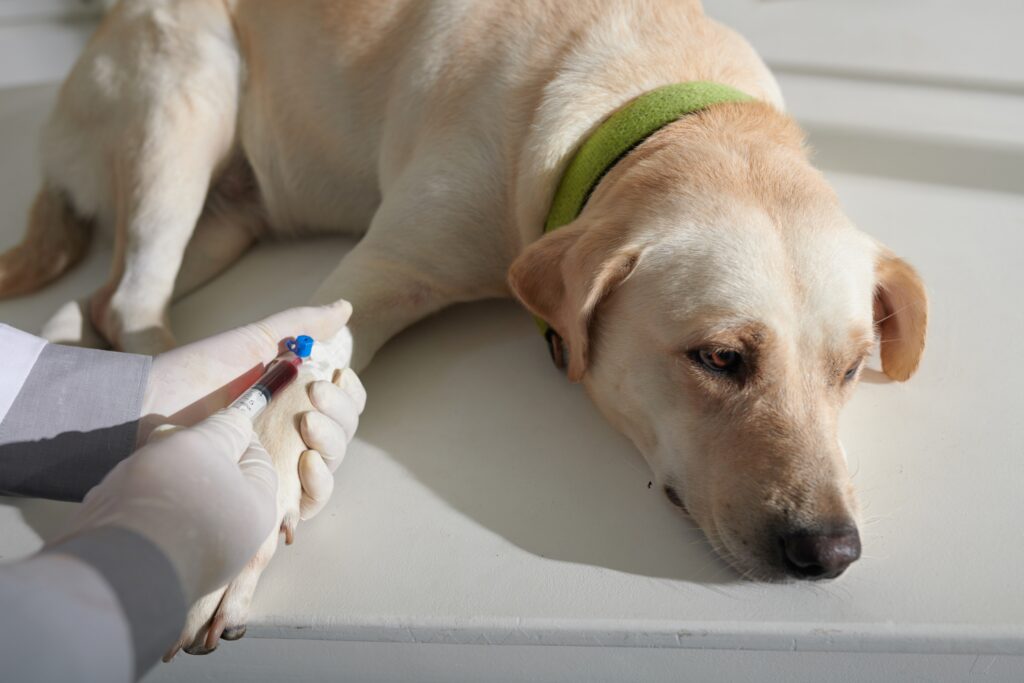Blood in the urine is no joke, and if you can see it when your dog pees, it’s time for a vet call. There are numerous causes, ranging from easily addressed bladder infections to cancers or sometimes fatal poisoning. Typically, you won’t see the blood unless it’s on a light-colored carpet, floor, or even in the snow.
When to Call the Veterinarian
If your dog suddenly begins peeing blood but is otherwise fine, call your vet and get an appointment. Most doctors recommend having your dog seen by the vet within 24 hours after you notice the blood. It may be nothing, but it could be indicative of something life-threatening.
However, if your dog is lethargic, has trouble urinating, is suddenly peeing more, or seems to “spot” often, it is more urgent. Be sure to note any behavioral, dietary, or other changes and tell your vet when you call. Every bit of extra information can help figure out what caused your dog to pee blood.
Tests, Tests, and More Tests!

For blood in the urine, your vet will probably want to do a blood panel.
©Dragon Images/Shutterstock.com
Because dogs can’t tell us what hurts and because they hide what hurts they have, it can be very difficult to figure out what’s going on. Your vet will likely want a blood panel and urinalysis to start, and pending those results may need to have more tests.
1. Bladder Infection
The most common cause of hematuria, or blood in the urine, is a bladder infection. Its causes include physiological structure and skin allergies. However, even though it’s common and easily treated doesn’t mean it can wait. Untreated bladder infections can spread to the kidneys.
2. Kidney Infection

Kidneys help filter waste and sometimes develop infections.
©Shidlovski/Shutterstock.com
Although not as common as bladder infections, kidney infections are another possible source of blood in the urine. Most kidney infections begin in the bladder and travel up to the kidney, so if it’s a kidney infection, the chances are pretty good that your dog has been dealing with it for a while.
2. Renal Telangiectasia
This rare condition occurs more often in breeds with a predisposition and is when one or more blood vessels in the kidney become enlarged. Corgis are more prone to it, as are a few others.
4. Bladder or Kidney Stones
The inflammation that stones in the urinary tract cause can make a dog pee blood. They may act more or less normally but show some discomfort when they urinate. It’s also possible that they’ll want to pee more often than usual.
6. Trauma
Blunt trauma, whether a car hit the dog or a horse kicked it, can cause internal bleeding that finds its way into the bladder, and from there, the urine. Generally, you’ll know whether your dog has had an accident like this because they probably have other, more obvious, injuries.
7. Cancer
Various cancers in the urinary tract can cause your dog to pee blood. Kidney and bladder cancers can grow tumors and cause intermittent blood in the urine. Your pooch may not be able to hold it and have accidents in the house, where they were once potty trained.
8. Prostate Problems
Just like human males, male dogs can have prostate problems. Everything from enlarged prostates to cancer can cause urine in the blood. If your male dog strains to pee or only seems to dribble a little, give your vet a call.
9. Bleeding Disorders
Dogs with blood clotting disorders have a higher chance of peeing blood. But ingesting poisons can also cause the problem. If your dog also seems lethargic or ill along with having blood in their urine, waiting for the next vet appointment isn’t an option.
10. Diabetes
Diabetes wreaks havoc on a body, dog or human. When the pancreas doesn’t function correctly, your dog (or you!) will have blood sugar levels that hop all over the place. Poorly controlled or undiagnosed diabetes can send the body into a tailspin of horrible symptoms, including bloody urine. Animals with diabetes drink significantly more water and pee a lot. If your dog suddenly has to take more potty breaks, it’s a good bet that they need a vet check.
11. Chemotherapy
Cancer treatments are almost as bad as the disease, even though they’re sometimes necessary. Chemotherapy can cause blood in the urine, along with a host of other issues. However, if your dog is receiving chemo, blood in the urine may not surprise you.
12. Idiopathic Haematuria
Sometimes, there isn’t a clear cause. Your dog could have taken a hard knock during a rough play session or ingested something that needs to work through their system. As long as it clears up and doesn’t happen again, it’s probably okay.
The photo featured at the top of this post is © Martin Christopher Parker/Shutterstock.com
Thank you for reading! Have some feedback for us? Contact the AZ Animals editorial team.







